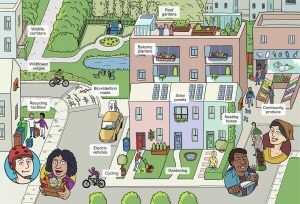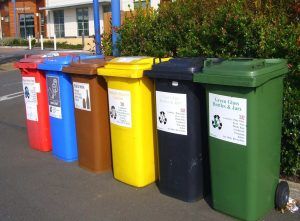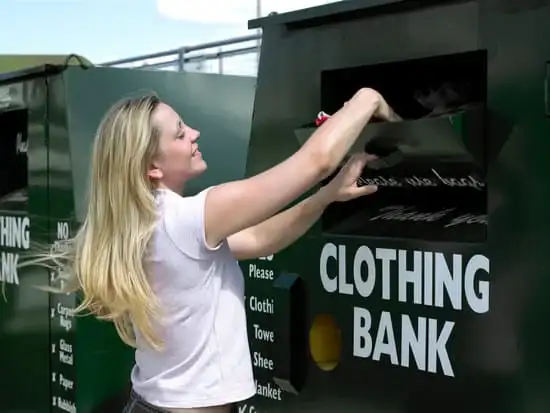
If you are unsure whether a charity will accept your clothes or other fabric items, consider donating them to the national charity Oxfam. They guarantee a use for any clothing or textile item (including shoes) no matter what the condition.
Also don’t forget that clothes made solely with natural fibres such as cotton and wool can be composted; but as the fibres are strong and are likely to take a long time to compost, shredding as much as possible will help.
Note: There is a concern that some dyes used in the production of clothing can be harmful to the environment and in theory, compost from clothes used for growing food, can have a detrimental effect on your fruit or vegetables.
♦ Cleaning, Laundry and General Maintenance Products
Although most cleaning and laundry items use plastic packaging, products such as perfumes, furniture polish, solvents and paints may come in glass or metal containers. Recycling some plastics can be a problem and will depend on your local council’s facilities, whilst glass or metal items can usually be easily recycled. Some waste is classed as hazardous* and should be taken to your local recycling centre rather than placed in your usual recycling bins.
Disposable products such as floor wipes should be disposed of in your general waste bin. This includes so called flushable ones as they can contribute to fatbergs before biodegrading. Paper kitchen towels and similar can be composted if they have not been chlorine-bleached (to make them look whiter).
If you are unsure whether an item can be recycled, contact your local council recycling centre (either by phone or email). Most council websites also have a section on local recycling facilities.
Another option available in some shops is being able to refill bottles or containers with washing up or laundry liquids, shampoos, and soaps. The choices are minimal, but you do tend to find that what is available is more environmentally friendly.
♦ Furniture, Appliances, IT Equipment and Broken or Unwanted Stuff
When buying new furniture or appliances, you often find that the packaging is excessive. The manufacturer’s argument is that it is there to protect their products from damage occurring during transit. Whilst this is true to a large extent, there can be no excuse in trying to source more environmentally friendly packaging.
As consumers we should do our best to recycle any packaging as best we can; but prior to any purchase, it might be an idea to carry out some research into the company’s ethics. The highest rated tend to at least consider more sustainable packaging and are less likely to be wasteful in other areas. Ethical Consumer magazine supplies ratings for many companies.
Don’t forget that buying second hand can be a good option, and in particular good quality furniture can be bought for a very reasonable cost. Older appliances though, are likely to cost more in energy usage compared to newer models and may also turn out to be unreliable.
From time to time you will have items that are broken or unwanted. For broken items, check out whether they can be locally repaired, rather than disposing of them at your local recycling centre.
Community repair shops run by volunteers are another option. They may only open a couple of times a month or perhaps even less, and although there is no guarantee that a fix is possible, assistance is given to help you repair your item.
The ‘rethinking poverty’ blog gives an outline of what a community repair shop is and also supplies the names of a few that are located in Greater Manchester.
For unwanted stuff consider donating them to a local charity or passing them on for free to family, friends and neighbours. The online sites ‘freecycle’ and ‘freegle’ are also another way of giving away items for free.
Food banks are another option. Besides food donations, they also accept personal and general household items. The Walesonline article takes a look at other items that may be as important as food donations.
There are also many ways to sell your items. Examples include Car Boot Sales, Gumtree and EBay. Cash raised could fund your green living ideas.
Do remember though that IT items such as computers or monitors may contain sensitive information and hazardous materials. Your local recycling centre will probably be able to take most of the items.
The alternative option is to contact a specialist organisation that may collect your equipment for free and securely destroy any data that remains. Many items can be refurbished and are appreciated by charities or other community organisations.
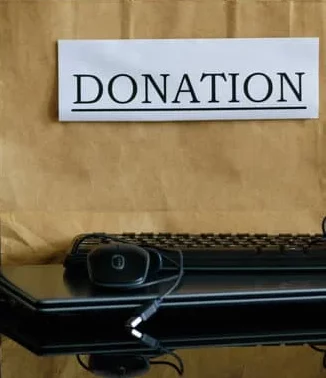
SECTION 12 Travel
Many of us find it difficult to change our travel habits. We prefer to use our cars as we consider public transport to be expensive, unreliable and not particularly convenient. We feel that we deserve our holidays abroad and air travel is often seen as the only option.
It is unfortunate that any good work in reducing your carbon footprint in other areas such as heating and lighting can be quickly undone by extravagant car usage and a couple of trips abroad travelling by plane.
Let’s consider the alternatives:
♦ Car Owners
Based on a report commissioned by Transport for Greater Manchester, Greater Manchester Combined Authority and Andy Burnham; it is stated that one in three car journeys in Greater Manchester were less than a kilometre, which could be covered in 15 minutes on foot, and change was clearly needed to encourage more people to travel actively.
From the above statistic, we can see that with only a little effort we should be able to reduce our car usage.
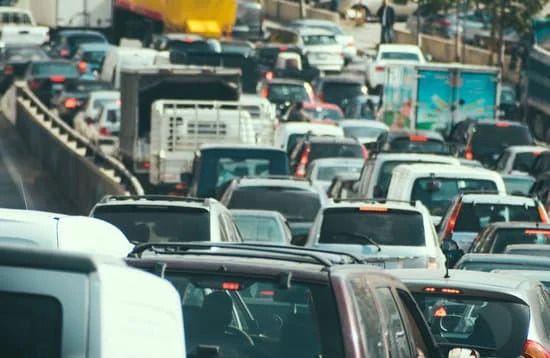
Shopping:
Can our weekly shopping trips by car be reduced? Perhaps make more trips, but use public transport or if the distance to the shops is not too far consider walking or cycling.
Walking and cycling is greener, healthier, and over the long term may reduce trips to the doctors and hospital. If walking is a problem, online shopping can be considered. This may be greener than even traveling to the shops by public transport, albeit at the expense of some local shops missing out on your custom.
What do you think? Have a read of the ABTS Training ‘home delivery vs a shopping trip’ research report.
Work:
For traveling to work, look at the possibilities of cycling or taking public transport. It doesn’t have to be every week, perhaps just during the school holiday season when the roads are a little quieter. Trains or Car share may be an option too.
For some, there is also the chance that you could work from home. Are you able to approach your employer with such an approach? Even taking into account the extra energy used at home, significant energy and monetary savings can be made by you and your employer.
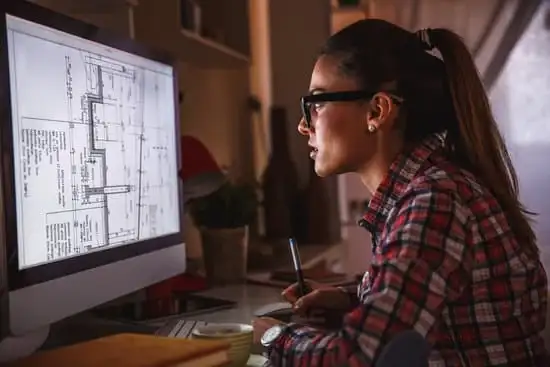
The School Run:
For the school run, walking shouldn’t be a problem for short distances. As we know, exercise will bring long term benefits to everyone. Car sharing may be the other option for those of you living some distance away.
UK Leisure Trips:
For UK based leisure and holiday trips, compare bus, coach and train to the car option. Train is usually best, but not always if it’s powered by diesel and you have an electric car.
A Change of Car:
From time to time, car owners want to or have to change their car. If your intention is to buy a new car, you should take into account that the CO2 emissions produced in the manufacture of new cars varies tremendously, even within the same class.
To give you an idea of the emissions of the type of car you are interested in, have a look at the ‘Next Green Car’ website. Try to choose one with low emissions.
Better still, consider purchasing a used car as this saves on the carbon manufacturing emissions of a brand new car.
From an environmental point of view an electric car is best, whilst hybrid cars are generally (but not always) viewed as being a little bit better than either petrol or diesel.
Note though, that from a carbon footprint point of view, you should hang onto your old car until it starts to spend more time getting repaired than being driven.
If you don’t spend much time in your car anyway, then joining a car club could be the answer. There’s no initial outlay or ongoing maintenance costs. Co Wheels is one such organisation with a national presence. No doubt there are many others.
♦ For Trips Abroad
Leisure:
For leisure trips abroad, a flight is often the only viable option unless you want to holiday in mainland Europe and have good transport links to Eurotunnel or a ferry port. You may also find a suitable holiday travelling by coach. Really your only other option is to look at taking more holidays in the UK.
Business:
Business travellers should consider whether these trips are necessary; a Skype, Zoom or Webinar may be the more productive answer for both yourself and your company.
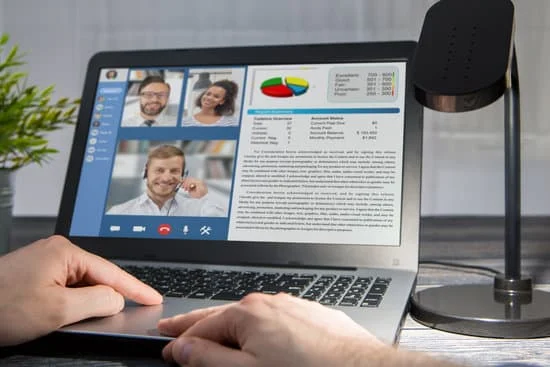
Anything else
After arriving at our destination, whether it’s for holidays, work, visiting friends or relatives, our mind-set should still be to think ‘green’. For example, when staying in a hotel, turn the lights and air-conditioning off when you leave your room; and don’t ask for your towels to be changed every day.
Also remember that many destinations rely on visitors to help keep the local economy going. If you can afford it, make a point of buying food, drink and other consumables in the area you are visiting rather than bringing it from home.
It will probably cost more but without your support, shops, pubs, restaurants and other businesses could fold which ultimately reduce the overall experience of visiting the area.


